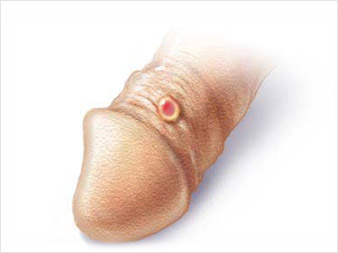Syphilis
 Syphilis is a STD (STI) which is often more prevalent among the gay or bisexual men. It is relatively frequent as around 500 cases are reported annually in Quebec. Syphilis is transmitted from person to person by direct contact with syphilis sores or skin lesions. Sores occur mainly on the external genitals, vagina, anus, or in the rectum. Sores can also occur on the lips and in the mouth. Syphilis can be transmitted during vaginal, anal, or oral sexual contact.
Syphilis is a STD (STI) which is often more prevalent among the gay or bisexual men. It is relatively frequent as around 500 cases are reported annually in Quebec. Syphilis is transmitted from person to person by direct contact with syphilis sores or skin lesions. Sores occur mainly on the external genitals, vagina, anus, or in the rectum. Sores can also occur on the lips and in the mouth. Syphilis can be transmitted during vaginal, anal, or oral sexual contact.
A period of 10-90 days can elapse between exposure and the appearance of symptoms. Often the symptoms can be mild and can easily go unnoticed. During the first stage of the infection, a single sore appears at the location where syphilis entered the body. The sore, which may be as large as 1 cm of diameter, is usually firm, round, and painless. Spontaneous healing will happen within 2 months whether or not the individual is treated. However, if the infected individual does not receive adequate treatment he/she remains contagious and the infection progresses.
Left untreated, syphilis can evolve over 10 -30 years. Late complications can involve the skin, bones and vital organs like the cardiovascular and nervous systems.
In men, the syphilis sore appears usually in the glans but can manifest elsewhere. In women, the sore is commonly found on the genitals but also on the cervix. The sore is painless and will heal spontaneously. This is why infected individuals may transmit the infection without being aware of it.
Syphilis is easily treated when diagnosed. Syphilis responds well to penicillin at doses adjusted to the disease stage. Alternate regimens are available for individuals with allergies to penicillin.
For syphilis screening or for a more complete STD (STI) screening, please contact the private medical clinic Crea-MeD at 514‑345‑1356 or email info@crea‑med.ca